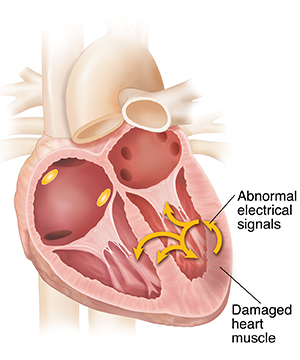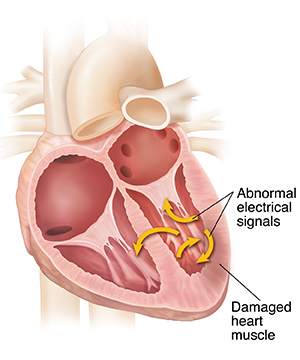The heart has its own electrical system to regulate the heartbeat. An abnormal change in the rate or pattern of the heartbeat is called an arrhythmia. It can cause the heart to move blood less efficiently. Four chambers hold blood as it moves through the heart. The 2 lower chambers of the heart are called ventricles. Problems with the electrical signals in the heart can make the ventricles beat faster than normal.
Ventricular tachycardia (VT)
Rapid electrical signals from the ventricles can result in a fast heart rhythm called ventricular tachycardia (VT).
-
With VT, abnormal electrical pathways or circuits form in the ventricles. This can be caused by any disease that damages the heart muscle. Or it can be caused by a problem you've inherited. It's most often seen as a result of a heart attack or coronary artery disease.
-
Electrical signals enter the abnormal circuit and loop around. With each loop, the signal tells the ventricles to contract. This makes the heart beat very fast. The heart may be beating too fast to pump blood. This can cause you to pass out. It can also cause cardiac arrest, leading to sudden death.
-
A less serious form of VT happens when overly excited ventricular muscle cells take over the heart rhythm. The heart is otherwise normal.
-
In some cases, VT develops into ventricular fibrillation. This is the most serious type of arrhythmia. It's fatal if not treated right away.
Ventricular fibrillation (VF)
At times, electrical signals may be sent so fast and unevenly that the heart muscle quivers and doesn’t beat at all. This is called fibrillation:
-
VF can occur if the ventricles have several abnormal circuits. Or it can happen if the heart muscle is suddenly injured, such as from a heart attack, and becomes electrically unstable.
-
Signals caught in the circuits make the ventricles beat very quickly and unevenly. This keeps the heart muscle from pumping correctly.
-
The heart can get to the point that it can’t pump at all. This is called cardiac arrest. Death will occur if emergency treatment isn't given to return the heart rhythm to normal. This treatment includes CPR and an energy shock to the heart (defibrillation).



